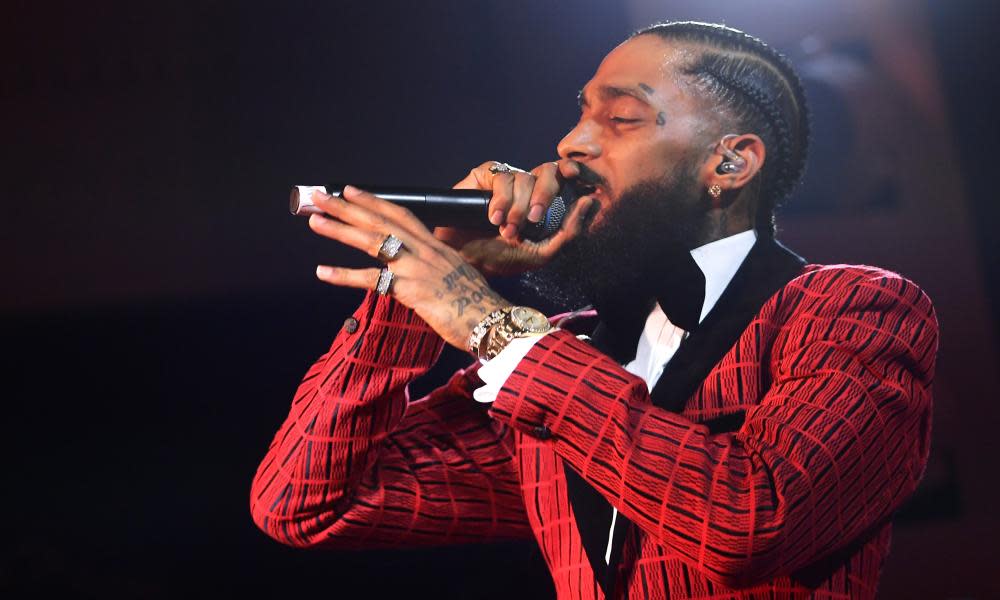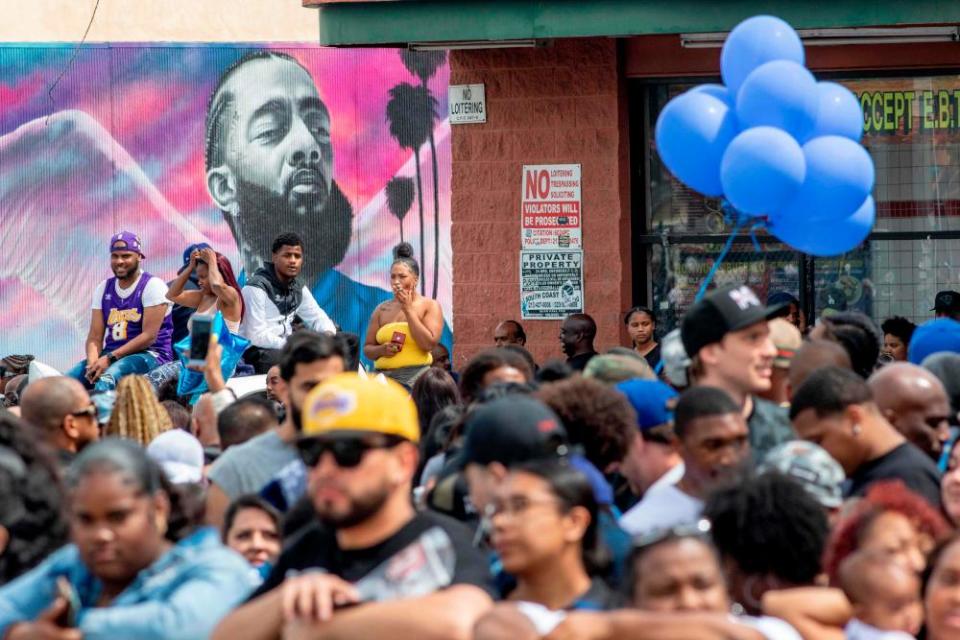Nipsey Hussle: community outraged at 'disgusting' LAPD investigation into rapper's business

Residents of South Los Angeles responded furiously to revelations that law enforcement was conducting a criminal investigation into the late rapper Nipsey Hussle’s businesses, saying it was further evidence of police unjustly criminalizing black institutions and neighborhoods.
The news that some city officials publicly mourned and honored Hussle while police were quietly targeting his life and work left community members deeply angry.
Organizers, activists and former gang members argued on Tuesday the city was not only disrespecting Hussle and his community, but was pursuing a harmful law enforcement strategy.
Skipp Townsend, a former gang member who now works in intervention, said the news of the city’s investigation would lead to further mistrust of police.
“It’s an attack on the legacy of Nipsey Hussle and an attack on people who want to invest in the community,” said Townsend.
Related: 'This is historic': How Nipsey Hussle's death inspired peace talks among rival LA gangs
Townsend noted that these kinds of investigations discourage longtime residents from opening businesses and were effectively “criminalizing people for being part of a community”.
“They are tarnishing his name,” he added.
The inquiry was reportedly launched long before the rapper was killed on 31 March, the New York Times reported on Monday, and continued after his death. It investigated Hussle, some of his business partners, and whether Hussle’s strip mall in South LA was a “hub of gang activity”.
Hussle grew up in Crenshaw, and invested into the LA district as he saw success in the music industry. He opened and supported black-owned businesses, provided jobs and other opportunities for locals, and transformed the strip mall he owned and where he ran his Marathon Clothing store into a South LA gathering spot.
The 33-year-old openly talked about his past involvement in gangs, and their effects in the neighborhood before being shot and killed in the parking lot of his strip mall, reportedly over a personal dispute.
Marqueece Harris-Dawson, the councilman for South LA, told the Guardian on Tuesday that police had confirmed there was an ongoing investigation, but had refused to provide details.
Harris-Dawson said he was stunned by police officials’ refusal to share basic information with him: “I’m the councilman, for God’s sake … It’s suspiciously opaque.”
As rival gangs that had long been in conflict began meeting to talk about possible truces and ways to prevent more bloodshed following Hussle’s death, LA authorities reportedly continued their investigations into Hussle and his properties. The case has allegedly involved the city attorney’s office, which is generally responsible for low-level misdemeanor cases and municipal ordinances. Harris-Dawson said that meant the investigation could have been some kind of “nuisance” case, which the city attorney has used in the past to crack down on gang activity.
But a nuisance investigation seemed unnecessary and unfair for the Marathon Store, which had grown into a thriving business at Crenshaw Boulevard and Slauson Avenue, the councilman said: “At most, they have a slightly annoying loitering problem that is common with any coffee shop that is successful.”

The LAPD spokesman Josh Rubenstein told the Guardian, “We’re working with the property owners to ensure that the criminal element is not occurring … [and] to mitigate any criminal issues.” He declined to comment further on the alleged “criminal” activity, adding, “We are trying to work with the community in a proactive and positive manner.”
Spokespeople for the city attorney’s office and Mayor Eric Garcetti declined to comment.
This week’s news was not the first hint of tensions between Hussle’s business and the city. During a eulogy at the rapper’s funeral, Hussle’s brother said the city and police had previously tried to evict them from the strip mall.
LaTanya Ward, another activist who coordinated meetings between rival gangs after Hussle’s death, said the investigation was part of a pattern of racist policing in LA.
“It just exposes what the people where we come from already know. We have no faith or hope in the police,” she said, adding that people gathered around the Marathon store, because it was built by people from the area. “Other neighborhoods have social clubs and nice places to go out and eat. We gotta create that shit for ourselves … They have to hang there, because where else the fuck they gonna hang?”
California has a controversial history of arresting and incarcerating people due to their purported gang ties, including widely criticized “gang injunctions” that prohibited certain people from being in the same spaces and were eventually deemed unconstitutional.
Investigating Hussle’s store for alleged gang activity felt like an extension of those policies, said Lanaisha Edwards, a South LA community organizer.
Edwards, who works on youth gang intervention and lost two brothers to gang violence, said that her relatives in the past had faced arrest simply because they were around other family members and considered part of the same gang under the injunctions.
She was not surprised to learn that police had targeted Hussle, but was disturbed to know it was ongoing: “What is the point? The man is already dead … It’s disgusting.”
“You’re going to mess with a black entrepreneur from the community, an icon who was all about change?” she added. “It’s sickening.”
She said it felt clear that some city leaders simply did not support Hussle’s investments in the neighborhood. “People are trying to change their community … and it’s never gonna look the way you want it to look,” she said, adding, “You had a week of no violence because of this man, but you are still going to try to find some way to defame him?”
This kind of news made it difficult for community organizers to collaborate with police, said Bernard Cooper, another former gang member who worked on truces between rival groups after Hussle’s death: “There’s credibility issues in the streets, and it impacts the whole movement. There are people working with police on one side, and then on the flip side, the police are investigating these people.”
“It’s counterproductive,” he added. “Police are not going to be the ones to help cure my community.”
Kenyatta Bakeer, a Black Lives Matter member, said Hussle’s work was an inspiration to so many people in South LA – and that any law enforcement crackdown would not prevent people from following in his footsteps: “We’re not letting it deter us.”

